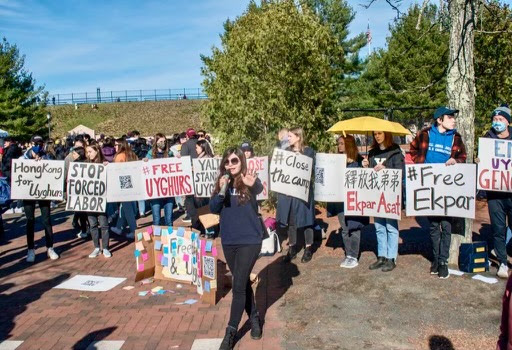Students march for Uyghur freedom before Yale-Harvard Game
Ahead of The Game, Yale Students for Uyghur Freedom called for action on the Uyghur crisis taking place in China.

Courtesy of Rayhan Asat
As fans flocked to the Yale-Harvard game on Saturday, Yale Students for Uyghur Freedom — along with Jackson Institute of Global Affairs World Fellow Rayhan Asat, whose brother, Ekpar Asat, disappeared into the vast network of Chinese internment camps in 2016 — led a march to raise awareness of the genocide against the Uyghur ethnic group.
Members of the Yale Students for Uyghur Freedom, or YSUF, held signs outside Gate C of the Yale Bowl at 11 a.m. as people entered the stadium ahead of The Game. The organization was founded for the purpose of “organizing the Yale community to understand, research and combat the ongoing genocide against Uyghurs in China,” according to paperwork submitted to the Office of the Secretary and Vice President for Student Life. As a new student organization, this was YSUF’s first public event.
“I’m hoping that the Chinese government would take this as a message and a rejection that Yalies would not tolerate these camps,” Asat said. “There are people fighting for [the Uyghurs], especially in the finest institutions like such as this one. How heartening can that be?”
Joelle Besch ’22, a member of YSUF active in organizing the march, described YSUF’s three main goals — education, research and advocacy — in further detail. The organization hopes to host events and marches like the one Saturday to spread awareness of the Uyghur genocide. Second, YSUF hopes to research “Yale’s possible contribution to the [Uyghur] genocide,” which at present is “unclear and needs further study,” according to Besch.
The Chinese government relied on genetic data inadvertently provided by Professor Emeritus of Genetics Dr. Kenneth Kidd to surveil and oppress Uyghurs in Xinjiang, Besch explained. She added that Yale’s endowment investments are unclear, and accordingly, Yale could be investing in companies that use Uyghur forced labor. Besch said that YSUF wants to ensure that Yale is not “profiting off of genocide or forced labor in Xinjiang,” and that “research from [Yale’s] affiliates does not contribute” to such exploitation.
“As someone who has benefited from Yale’s deep ties to China through participation in the Light Fellowship, I’m invested in seeing the institution continue the positive aspects of its relationship to China as much as possible, while simultaneously ensuring that it is not complicit in human rights abuses,” Besch said. “I believe everyone — Yale students included — should speak out against genocide.”
Besch told the News that she was also inspired by Asat, whose brother has been missing since 2016. The Asats are both Uyghurs, members of the Turkic-speaking Muslim ethnic group from Xinjiang. Reports from Amnesty International and Human Rights Watch attest that the Chinese government has committed crimes against humanity against the Uyghurs.
As such, Asat has spent time advocating in Washington for her brother’s release. Believing in the “court of public opinion,” she also finds “getting the American public to care about this issue… incredibly important.”
Besch said Asat was the “catalyst” for sparking discussions about the Uyghur genocide on campus, and even saw “the need for a formal student group” on the issue. In talking to students on campus, Asat said she “would just collect people’s numbers and [create] a WhatsApp group.”
YSUF has faced challenges in communication, as Besch explained that some students interested in joining the group “won’t join our WhatsApp group…email about Uyghurs on their email, fill in Google Forms, or call me by phone,” for fear of Chinese surveillance and possible government retaliation.
Nevertheless, YSUF encouraged student groups to co-sign their statement for the release of Ekpar Asat and the closure of the Uyghur camps. At present, the signatories include the Yale Globalist, Yale College Democrats, Jackson Women and the Yale Arab Student Association.
March participants stood outside Gate C of the Yale Bowl, some holding signs emblazoned with slogans like “Free Ekpar,” “Close the Camps” and “End Uyghur Genocide.” Others held yellow umbrellas in reference to the 2014 Hong Kong Umbrella Revolution. A number of participants wore masks and sunglasses and declined to give their names for interviews. Asat stood in front with a microphone.
“If you are passing through, please leave a message,” Asat said. “I’m here to say one simple message, close the camps. Nobody should be persecuted because of their race.”
As their presence slowed the crowd heading to the stadium, a number of people stopped to write a message about the Uyghur genocide on a trifold in front of the march participants. Reactions from the crowd were mostly positive.
A group of visitors from Florida State University and the University of Central Florida noted that while they were not aware of the Uyghur genocide before, they would be sure to spread the word back home.
Patrick Buckley GRD ’25 said that he liked that the march was “a little disruptive.” Another onlooker, Bilal Moin ’24, remarked that many of his friends who wanted to participate in the march were not doing so for fear of retaliation by the Chinese government.
“[The march] is certainly more effective here than anywhere else,” Harvard junior Peter Laskin said. “Is it effective on an absolute scale? I can’t say. I’m not the Chinese government.”
Yale Students for Uyghur Freedom was founded in October 2021.







